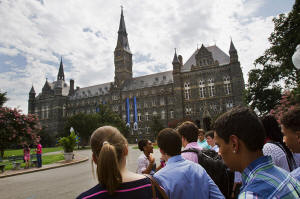International students weigh new risks of pursuing higher education in
the US under Trump
[March 25, 2025]
By CAROLYN THOMPSON
Since plunging during the COVID-19 pandemic, international student
enrollment in the U.S. has been rebounding — a relief to American
universities that count on their tuition payments. Two months into the
new Trump administration, educators fear that could soon change.
Unnerved by efforts to deport students over political views, students
from other countries already in the U.S. have felt new pressure to watch
what they say.
A Ph.D. student at the University of Rochester from South Asia said it
feels too risky to speak about LGBTQ+ causes she once openly championed
or even be seen near a political demonstration. With reports of travel
bans circulating, she likely won't fly home for the summer out of fear
she would not be allowed back into the U.S.
“You’re here for an education so you’ve got to keep moving forward on
that end,” said the student, who spoke on condition of anonymity for
fear of being targeted by authorities. “But also it’s very hard to, say,
‘OK, I’m at work. I’ve got to zone out. I can’t be thinking about the
news.’”
Educators worry it’s a balancing act that will turn off foreign
students. As the U.S. government takes a harder line on immigration,
cuts federal research funding and begins policing campus activism,
students are left to wonder if they’ll be able to get visas, travel
freely, pursue research or even express an opinion.

“It has a chilling effect,” said Clay Harmon, executive director of AIRC,
a membership organization focused on recruiting and enrolling
international students. “Even if there’s no direct consequence or direct
limitation right now, all of this cumulatively produces an impression
that the U.S. is not welcoming, it’s not open or that you may be in some
kind of danger or jeopardy if you do come to the U.S.”
During a recent trip to India, the biggest sender of students to the
U.S., the consensus among recruiting agencies was that far fewer of that
country’s students are interested in American colleges than in recent
years, Harmon said.
Some students are waiting to see how policy changes will play out, while
others already have deferred admission offers for fall 2025, he said.
Student social networks are active, and news about immigration-related
developments in America — like a Republican proposal to prevent Chinese
students from studying in the U.S. — spreads quickly.
Students in Canada, China, India and elsewhere have been seeking answers
and advice on Reddit and other social media sites, wondering whether to
move forward with U.S. plans, or choose a college in the United Kingdom,
Germany or elsewhere in Europe.
[to top of second column]
|

In this July 10, 2013, file photo, prospective students tour
Georgetown University's campus in Washington. (AP Photo/Jacquelyn
Martin, File)

International students are coveted as an antidote to declining
domestic enrollment and source of full-price tuition payments. In
the 2023-2024 academic year, 1.1 million international students at
U.S. colleges and universities contributed an all-time high $43.8
billion to the nation’s economy and supported more than 378,000
jobs, according to data released by NAFSA, an agency that promotes
international education.
International graduate students also play a large role in advancing
research, said Fanta Aw, who heads NAFSA.
Aw said universities must work to remind prospective students that
detentions like those of a pro-Palestinian activist Columbia
University and, more recently, a scholar at Georgetown University,
still are not the norm, despite the attention they receive.
“We have international students at lots of universities,” she said,
and news coverage has focused on consequences for international
students at just a couple of colleges. “So we have to also put into
perspective the fact that the vast majority of students are in
universities where we’re not hearing anything.”
The messaging from colleges and universities on the changing
political climate has varied. Some, including Northeastern
University in Boston, have responded to Trump’s directives with
webpages to keep current and prospective students informed.
“Our global community will continue to be a welcoming place for
admitted students from all corners of the world,” spokeswoman Renata
Nyul said via email.
Others have gone further. Bunker Hill Community College in Boston
has suspended its one- to two-week study abroad programs, citing
concerns about potential travel restrictions. Administrators at
Columbia’s Graduate School of Journalism have warned students who
are not U.S. citizens about their vulnerability to arrest or
deportation.
Brown University has advised international students and staff,
including visa holders and permanent residents, to postpone travel
after a Brown professor was deported to Lebanon despite having a
U.S. visa. Homeland Security officials later said she “openly
admitted” to supporting a Hezbollah leader and attending his
funeral.
All contents © copyright 2025 Associated Press. All rights reserved |